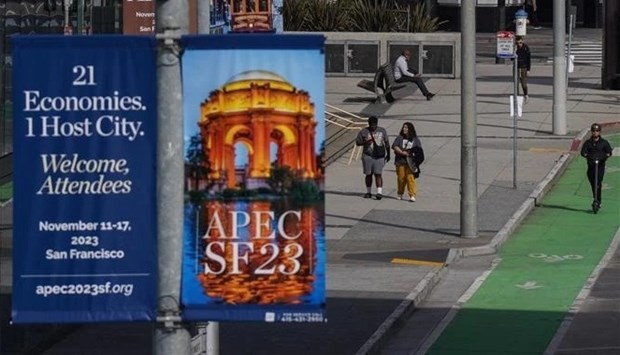Vietnamese State President Vo Van Thuong and other APEC economic leaders are scheduled to discuss issues of key significance to the world and regional economies, setting out directions for cooperation in trade, investment, science and technology, innovation, and many other fields during the APEC Leaders’ Week in San Francisco from November 14-17.
 |
| A poster on the 30th APEC Economic Leaders' Meeting on a street in San Francisco, California, the US. (Photo: AFP/VNA) |
The Asia-Pacific Economic Cooperation (APEC) forum currently has 21 members, including three world powers (the US, China, and Japan), along with nine from the G20 and many emerging and dynamic economies.
Recognising APEC’s role as the leading economic cooperation mechanism in the Asia-Pacific, which brings about many strategic, economic, trade and investment benefits, contributing to promoting the country's comprehensive development, Vietnam joined APEC in 1998 after entering the Association of Southeast Asian Nations (ASEAN) in 1995 and participating in the founding of the Asia-Europe Cooperation Forum (ASEM) in 1996.
Looking back at Vietnam’s 25-year APEC membership, Deputy Foreign Minister Nguyen Minh Hang said that joining APEC in 1998 is a strategic decision in Vietnam’s international economic integration, paving the way for its global integration and contributing to the development in the country and the region.
According to Hang, Vietnam’s imprints in APEC are demonstrated in three aspects. It has been among the few economies to host APEC Year, in 2006 and 2017, and is one of the most active members of APEC in proposing cooperation initiatives and projects, with 150 projects in various fields. Vietnam has affirmed its role in managing and speeding up the implementation of APEC cooperation through undertaking important positions in the forum’s mechanisms, she said.
APEC Year in 2006 and 2017 were successful, during which many important results with strategic significance to APEC as well as economic cooperation and connectivity in the Asia-Pacific were produced.
In 2006, Vietnam left a strong imprint with the Hanoi Action Plan to realise the Bogor targets in trade and investment facilitation. For the first time, APEC member economies agreed on the idea of forming a free trade area in the Asia-Pacific and overall orientations on APEC reform.
In 2017, Vietnam proposed the initiative of building post-2020 APEC vision and the establishment of the APEC Vision Group, reflecting the country’s long-term and overall approach, which received support and high evaluation from members, laying the foundation for the forum to adopt the joint statement on Putrajaya Vision 2040 which defines orientations, strategic goals and priorities of APEC cooperation in the new period.
The success of APEC Year 2006 and APEC Year 2017, along with other contributions that Vietnam has made to the forum, has helped raise the position, role and reputation of Vietnam in the world arena, helping the country optimise opportunities and resources from APEC cooperation and regional economic collaboration and linkage mechanisms to serve the country’s socio-economic development, the official stated.
Speaking to the Vietnam News Agency in Washington, Senior Official for East Asia-Pacific under the US Department of State Matt Murray said that Vietnam is an important APEC partner of the US with contributions to all efforts and different working process throughout the APEC Year.
Currently, the US is paying special attention to Vietnam's role and position in maintaining regional and global supply chains, he said. The US and other APEC members have been conducting a number of meetings and discussions within APEC on how to make supply chains more resilient, and Vietnam really plays a great role in the work, stated Murray.
The year 2023 marks 30 years since the first APEC Economic Leaders’ Meeting was held in Blake island, the US, in 1993. This years, the forum will review the implementation of the Aotearoa Action Plan on APEC Vision 2040. Member economies will report the progress of the plan in three pillars of trade-investment, innovation, and sustainable and inclusive growth.
Foreign Ministry’s Spokesperson Pham Thu Hang said that under the theme of “Creating a Resilient and Sustainable Future for All”, the meeting is focused on three priorities: "Interconnected" – building a resilient and interconnected region that advances broad-based economic prosperity; "Innovative" – working to enable an innovative environment for a sustainable future; and "Inclusive" – affirming an equitable and inclusive future for all.
APEC is currently the leading economic cooperation and association mechanism in the Asia - Pacific, which accounts for 38% of the global population, 62% of the global GDP and nearly 50% of the world trade value.
This year’s APEC Leaders’ Week is taking place in the context where the world economy as well as the global and regional economic connectivity has changed deeply, along with intertwined risks, challenges and opportunities, as well as traditional and non-traditional security challenges. This is an important moment requiring APEC members to strengthen dialogue and cooperation, turning challenges into opportunities for recovery and sustainable development.
President Thuong, his spouse and the high-level Vietnamese delegation’s participation at the APEC Leaders’ Week 2023 and bilateral activities in the US from November 14-17 holds a significant meaning. This is one of the major external relations activities of Vietnamese Party and State leaders in 2023, providing a chance for Vietnam to promote regional economic cooperation as well as bilateral partnership with world leading economies for sustainable development and prosperity.








Thông tin bạn đọc
Đóng Lưu thông tin